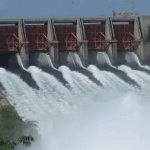
The Volta River Authority (VRA) has announced plans to convert the Akosombo Hydroelectric Dam into a massive power battery reserve as part of efforts to modernise Ghana’s energy infrastructure.
The project, which is still at the feasibility study stage, is aimed at making Akosombo more viable in the face of the global transition from hydro to thermal and renewable energy generation.
Speaking during a briefing with Parliament’s Energy Committee on Saturday , September 27, at Akosombo, VRA’s acting Chief Executive Officer, Ing. Edward Ekow Obeng-Kenzo, said the project would allow the dam to store renewable energy for later use.
He explained, “What we’re also doing with our hydro resources, because it depends on nature, we don’t want to deplete the hydro. So as we are transitioning to renewables, and because renewables are interruptible power, when you run the renewables during the daytime, in the evenings, they are off. So what we want to use at Akosombo is as a battery, because when you use a normal battery for the renewables, the cost goes very, very high.”
Detailing how the system would work, he added, “So during the daytime when the solars are running, we’ll preserve the water in Akosombo and in the evening we’ll bring Akosombo on board. So it acts as a battery and saves the country. And when we’re able to do that once, we can do it for the whole West Africa, because we have a huge water resource. So at least we always have a maximum amount of water to support generation and also to levelize the price, as I said last time. So it’s a study we are carrying out.”
Ing. Obeng-Kenzo also reassured the committee about the safety and strength of Ghana’s key hydro facilities, noting that both the Akosombo and Akuse dams have undergone retrofitting and are regularly reviewed by international experts.
He said, “We also carry out five-year dam assessment that is expect from dam review board across the world. They come to assess the dam to advise us on the integrity of the dam. They were here about three years ago; they’ll come next two years to assess again and advise us. There are some recommendations they made we are carrying through, and I’m sure it’s part of the expenditures we see in our budget to make sure the dam is safe.”
According to him, the latest works have extended the operational life of the dams.
“For now, per the work that we’ve done, we’ve extended the life of the dam for almost 40 years. That’s what anticipate we’ve done and then Akuse too the same but Akuse the works are still also ongoing. Akuse, we did a bit of retrofitting about five years ago to also extend the life for 30 more years,” he said.
“So at least we can say that our hydro facilities are ready to support the country in energy generation.” He concluded.

